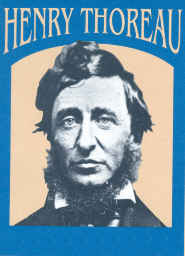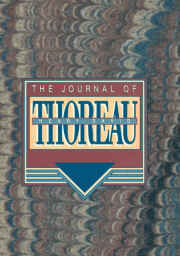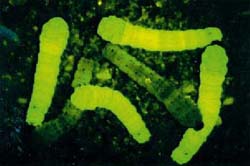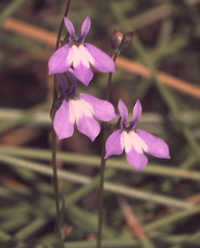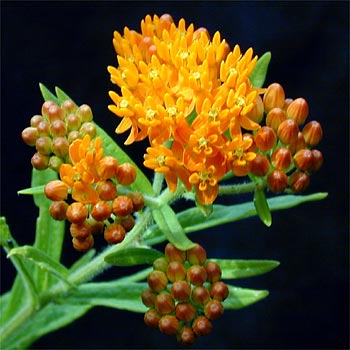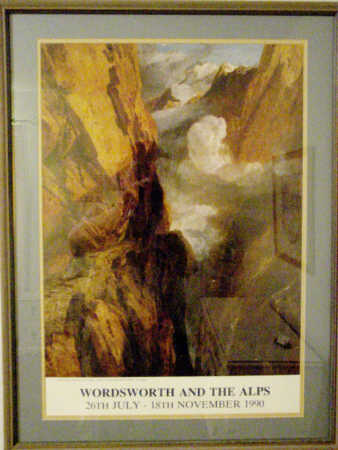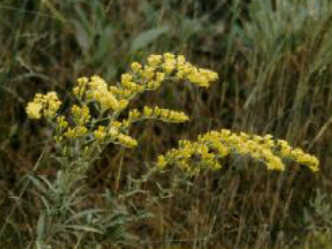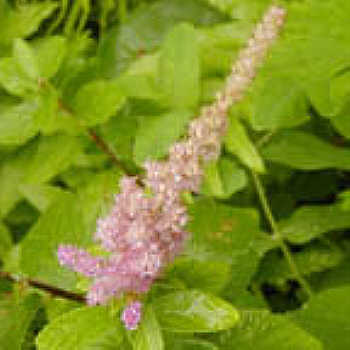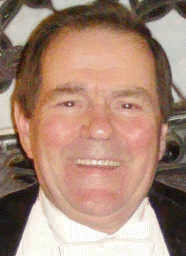Seasons come and seasons go
Winter falls with little show
But nothing eludes the glimpse
Of Henry David Thoreau.
The wind and rain have come
To settle their accounts for Fall
And washed the snow-fleas
From the meadow's trees.
Winter's springs are overfull
And the ducks can fly away;
We can stock our firewood
For the chilly winter's day.
When we read Shakespeare's writing, we become acquainted with the writer, but not with the one who
lived during the writing. The amazing thing about the recent movie "Shakespeare in Love" was that we
could see the writer living during the time he was writing and acting in his own plays! It was just such a
production that Thoreau bemoans the lack of below.
[page 131] The real facts of a poet's life would be of more value to us than any work of his art. I mean
that the very scheme and form of his poetry (so called) is adopted at a sacrifice of vital truth and poetry.
Shakespeare has left us his fancies and imaginings, but the truth of his life, with its becoming
circumstances, we know nothing about. The writer is reported, the liver not at all. Shakespeare's house!
how hollow it is! No man can conceive of Shakespeare in that house. But we want the basis of fact, of an
actual life, to complete our Shakespeare, as much as a statue wants its pedestal. A poet's life with this
broad actual basis would be as superior to Shakespeare's as a lichen, with its base or thallus, is superior in
the order of being to a fungus.
Thoreau sat on Conantum and watched the sun set on October 28 and recorded seeing a beam of light
break through the gray clouds. His description of this scene includes both the external beauty and his
reverie which it sparked within himself.
[page 133] It was but a transient ray, and there was no sunshine afterward, but the intensity of the light
was surprising and impressive, like a halo, a glory in which only the just deserved to live. . . . It was a
serene, elysian light, in which the deeds I have dreamed of but not realized might have been performed. At
the eleventh hour, late in the year, we have visions of the life we might have lived. No perfectly fair
weather ever offered such an arena for noble acts. It was such a light as we behold but dwell not in! In
each case, every recess was filled and lit up with this pure white light. The maples were Potter's, far down
the stream, but I dreamed I walked like a liberated spirit in their maze.
Thoreau loves the wild apples and compares himself to them. "Nevertheless, our wild apple is wild only
like myself, perchance, who belong not to the aboriginal race here, but have strayed into the woods from
the cultivated stock."(2) We can read what he says in the passage below and perhaps come to believe that
Thoreau himself was a "prince in disguise."
[page 136, 137] Even the sourest and crabbedest apple, growing in the most unfavorable position,
suggests such thoughts as these, it [is] so noble a fruit. Planted by a bird on a wild and rocky hillside, it
bears a fruit, perchance, which foreign potentates shall hear of and send for, though the virtues of the
owner of the soil may never be heard of beyond the limits of the village. It may be the choicest fruit of its
kind. Every wild apple shrub excites our expectation thus. It is a prince in disguise, perhaps.
Imagine a wild apple tree eaten by cattle until it can bear no fruit and finally the shrub gets so wide that
the cattle are unable to reach the interior shoots and the fruit can grow there. The wild apple tree has that
way created a fence out of its own material. Thoreau seemed to create a fence around himself with his own
wild apple ways. Small wonder he revered the wild apple so — it was a plant which survived as he did, in
the wild, away from any tended garden or orchard. Like him, it produced the sweetest fruit, but only for
those who loved solitary walks in the forest and had cultivated an out-of-doors palate.
[page 137, 138] What a lesson to man! So are human beings, referred to the highest standard, the celestial
fruit which they suggest and aspire to bear, browse on by fate, and only the most persistent and strongest
genius prevails, defends itself, sends a tender scion upward at last, and drops its perfect fruit on the
ungrateful earth; and that fruit, thought somewhat smaller, perchance, is essentially the same in flavor
and quality as if it had grown in a garden. That fruit seems all the sweeter and more palatable even for
the very difficulties it has contended with.
The skunk cabbage is like a warm-blooded animal in that it can continue to grow and thrive in cold
weather, even melting the snow around itself. The heat it creates also sends the strong scent from which
its name derives over longer distances to attract pollinators. To Thoreau this plant was a symbol of
optimism and rebirth in the dark months of the year and a sure cure for melancholy which is now call
SAD or Seasonal Affectional Disorder. As Thoreau rightly says, "There is no can't nor cant to them."
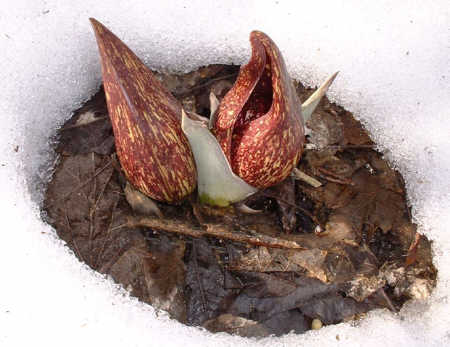
[page 150] Oct. 31. If you are afflicted with melancholy at this season, go to the swamp and see the brave
spears of skunk cabbage buds already advanced toward a new year. Their gravestones are not bespoken
yet. Who shall be sexton to them?(3) Is it the winter of their discontent? Do they seem to have lain down to
die, despairing of skunk-cabbagedom? "Up and at 'em," "Give it to 'em," "Excelsior," "Put it through,"
— these are their mottoes. Mortal human creatures must take a little respite in this fall of the year; their
spirits do flag a little. There is a little questioning of destiny, and thinking to go like cowards to where the
"weary shall be at rest." but not so with the skunk-cabbage. Its withered leaves fall and are transfixed by
a rising bud. Winter and death are ignored; the circle of life is complete. Are these false prophets? Is it a
lie or a vain boast underneath the skunk-cabbage bud, pushing it upward and lifting the dead leaves with
it? They rest with spears advanced; they rest to shoot!
I say it is good for me to be here, slumping in the mud, a trap covered with withered leaves. See those
green cabbage buds lifting the dry leaves in that watery and muddy place. There is no can't nor cant to
them. They see over the brow of winter's hill. They see another summer ahead.
Thoreau says that he doesn't wish to see poor men in rich houses, but would rather see one rich man in a
poor house. Men should build with local materials that they can afford and not crave for expensive
materials from a distant land. That can only lead to bankruptcy, he says. (Page 165)
[page 165, 166] For a man to pride himself on this kind of wealth, as if it enriched him, is as ridiculous as
if one struggling in the ocean with a bag of gold on his back would gasp out, "I am worth a hundred
thousand dollars!"(4) I see his ineffectual struggles just as plainly, and what it is that sinks him.
Have you seen the bumper stickers with the theme, "I Rather Be X", where X usually involves being in
some other place skiing, sun-bathing, sky-diving, golfing, etc? Anyone who wishes to be somewhere
else "excommunicates oneself" according to Thoreau, in other words, such a one is put out of communion
or fellowship with oneself. Such a person is without roots in one's native soil, and thus too in one's own
soil of being. Thus, it follows for Thoreau that the poet should be the hardest person to transplant to
another area. The poet does not need to see the Pyramids to think Pyramid thoughts.
[page 190, 191] In books, that which is most generally interesting is what comes home to the most
cherished private experience of the greatest number. It is not the book of him who has traveled the
farthest over the surface of the globe, but of him who has lived the deepest and been the most at home. If
an equal emotion is excited by a familiar homely phenomenon as by the Pyramids, there is no advantage
in seeing the Pyramids. It is on the whole better, as it is simpler, to use the common language. We require
that the reporter be very permanently planted before the facts which he observes, not a mere passer-by;
hence the facts cannot be too homely. A man is worth most to himself and to others, whether as an
observer, or poet, or neighbor, or friend, where he is most himself, most contented and at home. There his
life is the most intense and he loses the fewest moments. Familiar and surrounding objects are the best
symbols and illustrations of his life. If a man who has had deep experiences should endeavor to describe
them in a book of travels, it would be to use the language of a wandering tribe instead of a universal
language. The poet has made the best roots in his native soil of any man, and is the hardest to transplant.
The man who is often thinking that it is better to be somewhere else than where he is excommunicates
himself. If a man is rich and strong anywhere, it must be on his native soil. Here I have been these forty years learning the language of these fields that I may the better express myself. If I should travel to the prairies, I should much less understand them, and my past life would serve me but ill to describe them. Many a weed here stands for more of life to me than the big trees of California would if I should go there. We only need travel enough to give our intellects an airing.
Is it so strange these days to prefer to be alone than in the company of others? Can one think and share
large thoughts among those for whom the very concept of large thoughts is incomprehensible? And yet is
that not the lot of so many people today? Thoreau knew this well and was unafraid of expressing it.
[page 204] I do not know if I am singular when I say that I believe there is no man with whom I can
associate who will not, comparatively speaking, spoil my afternoon. That society or encounter may at last
yield a fruit which I am not aware of, but I cannot help suspecting that I should have spent those hours more
profitably alone.
Thoreau no doubt had a healthy appetite and as such enjoyed eating the simplest foods. He explains his
love of everyday sounds by analogy to an appetite for sounds. Anyone who has entered a reduced calorie
or other eating regimen will have noted before long that one is suddenly able to taste a sweetness in
common vegetables such as green beans which was not discernible before when one's appetite was cloyed
by a surfeit of heavy foods.
[page 227] The commonest and cheapest sounds, as the barking of a dog, produce the same effect on fresh
and healthy ears that the rarest music does. It depends on your appetite of sound. Just as a crust is
sweeter to a healthy appetite than confectionery to a pampered or diseased one. It is better that these
cheap sounds be music to us than that we have the rarest ears for music in any other sense.
Style over substance seems to prevail in our time as it did in Thoreau's time. We go to a lecture and expect
to be entertained with private thoughts and instead we are fed someone else's thoughts second-hand that
we could have better sat home and read directly to more profit.
[page 228] I am disappointed by most essays and lectures. I find that I had expected the authors would
have some life, some very private experience, to report, which would make it comparatively unimportant
in what style they expressed themselves, but commonly they have only a talent to exhibit.
One can presume that Buffum was not disappointing in his lecture reported below, as he and Thoreau
subsequently spent the next couple of days together in the region of of Lynn and Nahant.
[page 243] Jan. 13. Go to Lynn to lecture, via Cambridge.
4:30 P. M. — At Jonathan Buffum's, Lynn. Lecture in John B. Alley's parlor. Mr. J. Buffum describes to
me ancient wolf-traps, made probably by the early settlers in Lynn, perhaps after an Indian model; one
some two miles from the shore near Saugus, another more northerly; holes say seven feet deep, about as
long, and some three feet wide, stoned up very smoothly, and perhaps converging a little, so that the wolf
could not get out. Tradition says that a wolf and a squaw were one morning found in the same hole,
staring at each other.
Thoreau often feels melancholy, especially during the cold, drab winter months when natural food is
scarce during his walks, but Nature seems ever ready to revive his spirits with one of its many beautiful
extravagances. This time on Jan. 6. the miracle of the snowflake touched Thoreau's sleeve and his heart
which leads him to wax eloquent, calling up visions of a battle of chariots in the heavens from which these
wheels of wonder have descended to the arm of his long coat. Few people today can pause to say as he did,
"We are rained and snowed on with gems." That is the function of poets in any age, to pause, notice, and
say the things that others in their rush of getting and achieving let pass unnoticed. The very structure of
the poet's meter and rhymes are designed to break the fast-paced breathing of the getting and achieving
one, to slow down one's breathing and allow beauty to enter one's mind and heart.
[page 238, 240] I was feeling very cheap, nevertheless, reduced to make the most of dry dogwood berries.
Very little evidence of God or man did I see just then, and life not as rich and inviting an enterprise as it
should be, when my attention was caught by a snowflake on my coat-sleeve. It was one of those perfect,
crystalline, star-shaped ones, six-rayed, like a flat wheel with six spokes, only the spokes were perfect little
pine trees in shape, arranged around a central spangle. This little object, which, with many of its fellows,
rested unmelting on my coat, so perfect and beautiful, reminded me that Nature had not lost her pristine
vigor yet, and why should man lose heart? Sometimes the pines were worn and had lost their branches,
and again it appeared as if several stars had impinged on one another at various angles, making a
somewhat spherical mass. These little wheels came down like the wrecks of chariots from a battle waged
in the sky. There were mingled with these starry flakes small downy pellets also. This was at
mid-afternoon, and it has not quite ceased snowing yet (at 10 P. M.). We are rained and snowed on with
gems. I confess that I was a little encouraged, for I was beginning to believe that Nature was poor and
mean, and I was now convinced that she turned off as good work as ever. What a world we live in! Where
are the jewelers' shops? There is nothing handsomer than a snowflake and a dewdrop. I may say that the
maker of the world exhausts his skill with each snowflake and dewdrop that he sends down. We think that
the one mechanically coheres and that the other simply flows together and falls, but in truth they are the
product of enthusiasm, the children of an ecstasy, finished with the artist's utmost skill.
In this next passage Thoreau draws an analogy of the white man to the red man, noting the two are
dissimilar to each other as the dog is to the fox. One wonders if the dog and the fox were more alike before
humans domesticated the dog, but not the fox. And whether the Indian were less like the fox before the
white man came to this land.
[page 252, 253] The dog is to the fox as the white man to the red. The former has attained to more
clearness in his bark; it is more ringing and musical, more developed; he explodes the vowels of his
alphabet better; and beside he has made his place so good in the world that he can run without skulking
in the open field. What a smothered, ragged, feeble, and unmusical sound is the bark of the fox! It seems
as if he scarcely dared raise his voice lest it should catch the ear of his tame cousin and inveterate foe.
By Jan. 24, Thoreau was upset that there had not been enough snow for sleighing that winter.
[page 254] What is winter without snow and ice in this latitude? The bare earth is unsightly. This winter
is but unburied summer.
Next Thoreau compares a squash that weighs about as much of a man to a man and finds that the squash
would have as much to say about God as a man might. In the squash-man metaphor we find Thoreau
shaping a biting satire of everyman.
[page 261] I raised last summer a squash which weighed 123 ½ pounds. If it had fallen on me it would
have made as deep and lasting an impression as most men do. I would just as lief know what it thinks
about God as what most men think, or are said to think. In such a squash you have already got the bulk of
a man. My man, perchance, when I have put such a question to him, opes his eyes for a moment, essays in
vain to think, like a rusty firelock out of order, then calls for a plate of that same squash to eat and goes to
sleep. . . .
Every writer, I daresay, has experienced a quickened passage of time as one is writing and composing.
Of all the compositions that Shakespeare wrote, we have no direct report as to whether he experienced
this phenomenon as he wrote. If all writing is biography, then we might find some passage in Shakespeare
which describes this quickened passage of time, but Thoreau's Journal-writing is real-time biography,
recorded as it happens.
[page 263] Time never passes so quickly and unaccountably as when I am engaged in composition, i. e. in
writing down my thoughts. Clocks seem to have been put forward.
Our metaphor of "being stuck in a quagmire" belies the origin of its root quag as Thoreau explains it.
[page 272] This is a regular quag, or shaking surface, and in this way, evidently, floating islands are
formed. I am not sure but that meadow, with all its bushes in it would float a man-of-war.
Spruce tea, after reading Thoreau's description, I think I shall stay away from, perhaps because to me
turpentine comes from a can and is associated with paint smells. This passage shows how adventuresome
he was with eating and brewing food stuffs he found on his walks. He is talking below of twigs and leaves
of spruce.
[page 274] I brought some home and had a cup of tea made, which, in spite of a slightly piny or
turpentine flavor, I thought unexpectedly good.
Thoreau uses weird fractions in his measurements, such as talking about a board that is 15 and
five-twelfths feet long. That is easy to understand as a twelfth of a foot is an inch, but how can one explain
the origin of "three sevenths of an inch" in this next passage?
[page 275] I observed yesterday in that oak stump on the ditch-bank by Trillium Wood (which I counted
the rings of once) that between the twentieth and twenty-seventh rings there was only about three
sevenths of an inch, though before and after this it grew very fast and seven spaces would make nearly
two inches.
My speculation is not that Thoreau had a ruler marked in sevenths of an inch (unlikely), but that he
was accustomed to making fractions of readily available portions of the world. The distance of two inches
held 7 rings (27-20), he knew this by something he had that was two inches long. Each ring was then
two-sevenths of an inch. It would easy to add half a ring to get the length therefore of three-sevenths. One
must recall that Thoreau was a surveyor and was used to doing ratios of various odd-sized lengths on the
spur of the moment to make measurements for his land plots.
In this next passage, we can note that our common word "canyon" came to us from the Spanish and we
have added the "y" to replace the tilde over the "n".
[page 284] Far from here, I see the surface of weeds and mud lifted up in like manner where there is no
cañon or rill, but a puddle.
On the coldest day of the winter, Thoreau is at home writing and notes that one who is abroad on such a
day deals only with the surfaces of things, that only one who is home can afford to deal with inner things
such as feelings and thoughts.
[page 285] Feb. 19 The traveler is defended and calloused. He deals with surfaces, has a greatcoat on. But
he who stays at home and writes about homely things give us naked and tender thoughts and sentiments.
When Spring arrives, Thoreau is overjoyed. He notes the rhythmic cadence of the first bird he hears after
the long winter, a flicker, and notes that its sound "peoples" the hitherto barren fields and forests of his
daily walks.
[page 300] March 17. Ah! there is the note of the first flicker, a prolonged, monotonous
wick-wick-wick-wick-wick-wick, etc., or, if you please, quick-quick, heard far over and through the dry
leaves. But how that single sound peoples and enriches all the woods and fields! They are no longer the
same woods and fields that they were. This note really quickens what was dead. It seems to put a life into
withered grass and leaves and bare twigs, and henceforth the days shall not be as they have been.
Thoreau likens the forest being quickened by the flicker to his neighbor's house which comes alive when
the family arrives home after being away for a long time. Clearly Thoreau, the solitary bachelor for all his
life, lived in a world with as much excitement as parents with a houseful of children.
[page 300, 301] It is as when a family, your neighbors, return to an empty house after a long absence, and you hear the
cheerful hum of voices and the laughter of children, and see the smoke from the kitchen fire. The doors
are thrown open, and children go screaming through the hall. So the flicker dashes through the aisles of
the grove, throws up a window here and cackles out it, and then there, airing the house. It makes its voice
ring up-stairs and down-stairs, and so, as it were, fits it for its habitation and ours, and takes possession.
It is as good as a housewarming to all nature. Now I hear and see him louder and nearer on the top of the
long-armed white oak, sitting very upright, as is their wont, as it were calling for some of his kind that
may also have arrived.
In this next paean to Spring, we spy evidence that Thoreau writes on location. He is looking out from Fair
Haven Hill, about two-thirds of the way up. He notices the snow is off the mountains "which seem even to
have come again like the birds." The wind is blowing hard enough that he is having trouble writing.
[page 305] The undulating river is a bright-blue channel between sharp-edged shores of ice retained by
the willows. The wind blows strong but warm from west by north, so that I have to hold my paper tight
when I write this, making the copses creak and roar; but the sharp tinkle of a song sparrow is heard
through it all. But ah! the needles of the pine, how they shine, as I look down over the Holden wood and
westward! Every third tree is lit with the most subdued but clear ethereal light, as if it were the most
delicate frostwork in a winter morning, reflecting no heat, but only light. And as they rock and wave in
the strong wind, even a mile off, the light courses up and down there as over a field of grain; i. e., they are
alternately light and dark, like looms above the forest, when the shuttle is thrown between the light woof
and the dark web, weaving a light article, — spring goods for Nature to wear. At sight of this my spirit is
like a lit tree. It runs or flashes over their parallel boughs as when you play with the teeth of it comb. The
pine-tops wave like squirrels' tails flashing in the air. Not only osiers but pine-needles, methinks, shine in
the spring, and arrowheads and railroad rails, etc., etc. Anacreon noticed the same. Is it not the higher
sun, and cleansed air, and greater animation of nature? There is a warmer red to the leaves of the shrub
oak, and to the tail of the hawk circling over them.
The gossamer appears to Thoreau in the Spring just as in the Fall. Once again he is unable to locate a
spider to explain the unexpected appearance of these cottony threads everywhere.
[page 327] Small cottony films are continually settling down or blown along through the air. Does not this
gossamer answer to that of the fall? They must have sprung to with one consent last night or this morning
and bent new cables to the clods and stubble all over this part of the world.
Thoreau is equally at home with eagle thoughts as he is with sparrow thoughts as we read in this next
passage. He spots a large bird in a distance and watches it as it takes off until he is sure by its very mode
of flight that it must be an eagle.
[page 331] It sits there facing me some forty or fifty rods off, pluming itself but keeping a good lookout.
At this distance and in this light, it appears to have a rusty-brown head and breast and is white beneath,
with rusty leg-feathers and a tail black beneath. When it flies again it is principally black varied with
white, regular light spots on its tail and wings beneath, but chiefly a conspicuous white space on the
forward part of the back; also some of the upper side of the tail or tail-coverts is white. It has broad,
ragged, buzzard-like wings, and from the white of its back, as well as the shape and shortness of its wings
and its not having a gull-like body, I think it must be an eagle. It lets itself down with its legs somewhat
helplessly dangling, as if feeling for something on the bare meadow, and then gradually flies away, soaring
and circling higher and higher until lost in the downy clouds. This lofty soaring is at least a grand
recreation, as if it were nourishing sublime ideas. I should like to know why it soars higher and higher so,
whether its thoughts are really turned to earth, for it seems to be more nobly as well as highly employed
than the laborers ditching in the meadow beneath or any others of my fellow townsmen.
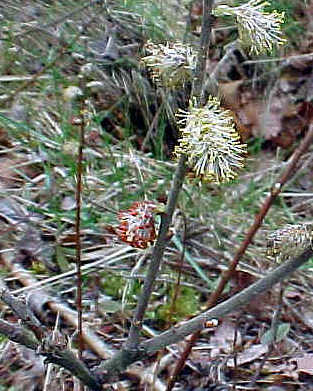
On May 1 Thoreau hears the hum of honey-bees and that tells him that the silky swamp willow (Salix
sericea) is in bloom. Note that "humblebee" is another name for the common "bumblebee".
[page 393] The old Salix sericea is now alive with the hum of honey-bees. This would show that it is in
bloom. I see and hear one humble bee among them, inaugurating summer with his deep bass.
Here is a passage in which Thoreau mentions the nine penny coin which must have been as common in
his day as the quarter is to us in 2007, and probably more valuable as it would buy as much as three
drinks at a local tavern in his day.
[page 401] Saw and heard the small pewee yesterday. The aspen leaves at Island to-day appear as big as a
nine-pence suddenly.
A bricklayer works from sun to sun, but a thinker's work is never done. Pardon the paraphrase of a
common saying, but Thoreau has inspired me with this next passage. As a writer myself, I know that the
common impression of a writer is some lazy lout who is not good enough for the workday world, someone
who lolls around the house and occasionally places a few words on paper and calls it a day. Nothing could
be further from the truth, but only those who have held the full-time job of a writer will know this truth.
Thoreau did and this is perhaps his finest expression of what it is to be a writer, to undertake the mighty
task of bringing a thought into written form on a page.
[page 404, 405] The thinker, he who is serene and self-possessed, is the brave, not the desperate soldier.
He who can deal with his thoughts as a material, building them into poems in which future generations
will delight, he is the man of the greatest and rarest vigor, not sturdy diggers and lusty polygamists. He is
the man of energy, in whom subtle and poetic thoughts are bred. Common men can enjoy partially; they
can go a-fishing rainy days; they can read poems perchance, but they have not the vigor to beget poems.
They can enjoy feebly, but they cannot create. Men talk of freedom! How many are free to think? free
from fear, from perturbation, from prejudice? Nine hundred and ninety-nine in a thousand are perfect
slaves. How many can exercise the highest human faculties? He is the man truly — courageous, wise,
ingenious — who can use his thoughts and ecstasies as the material of fair and durable creations. One man
shall derive from the fisherman's story more than the fisher has got who tells it. The mass of men do not
know how to cultivate the fields they traverse. The mass glean only a scanty pittance where the thinker
reaps an abundant harvest. What is all your building, if you do not build with thoughts? No exercise
implies more real manhood and vigor than joining thought to thought. How few men can tell what they
have thought! I hardly know half a dozen who are not too lazy for this. They cannot get over some
difficulty, and therefore they are on the long way round. You conquer fate by thought. If you think the
fatal thought of men and institutions, you need never pull the trigger. The consequences of thinking
inevitably follow. There is no more Herculean task than to think a thought about this life and then get it
expressed.
One day I drove to a Naval Air Station several miles from where I sit typing today. The Elevation Marker
on the Airfield was 1 Foot above sea level. That's about the average elevation hereabouts where I was
born and grew up in southern Louisiana. So, why, some people must wonder, do I write for Good
Mountain Press? One woman even wrote to me in care of "Good Morning Press", a name that I have
grown fond of since she wrote me. As an adult I lived for a total of nine years collectively in East
Tennessee, Southern California, and Massachusetts, all three areas in close proximity to mountains. I
loved the mountains and how they lifted my spirits. By the time I returned to my roots at sea level, I had
learned to keep that mountain-top and mountain-viewing feeling with me wherever I was. Whenever we
have a thunderstorm here, which almost is daily during the summer, the air grows cooler and the area fills all around with ionized air just like on a mountain top. While the storm is still visible from a distance, its thunderhead
tops 60,000 feet which makes it the world's tallest mountain. So without moving from my swing at sea level, I can experience both the mountain-top feeling and the mountain-viewing feeling of a distant mountain range. These are my good mountains.
[page 430] May 17. I doubt if in the landscape there can be anything finer than a distant mountain-range.
They are a constant elevating influence.
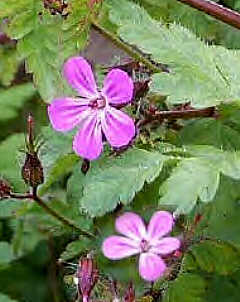
While beginning his ascent of Monadnock mountain on June 2, Thoreau described some of the local
plants. I will close this review of an image of the Geranium Robertianum which he found at the base of the
mountain.
[page 453] Here, at the base, by the course of a rocky rill, where we paused in the shade, in moist ground,
I saw the Tiarella cordifolia, abundant and apparently in prim, with its white spike sometimes a foot and
more high; also the leaves of the Geranium Robertianum, emitting their peculiar scent, with the radical
reddish tinge, not yet budded.
We will close our walk through the woods with Henry, a decade of years and volumes, with many miles
and seasons behind us. Were we alive in Henry's time, he would not have allowed us his company, but one
hundred and fifty years of separation, and we are fit company indeed for our intrepid explorer of
Concord. He allows us to observe the flora and fauna which he observes, to climb the mountains he
climbs, to paddle and float down the rivers in his boat, to reach into pouts' nests with him, to pluck up a
handful of coupling frogs, to raise spawn in a firkin with him, to think sparrow thoughts and eagle
thoughts with him, to quicken our hearts with his as the flicker quickens the wintry woods back into springy
life. Till we meet again in these pages, dear Reader, let me say to you what H. D. T.'s friend R. W. E. said
about what a friend is, "We will meet as though we met not, and part as though we parted not."
~^~
---------------------------- Footnotes -----------------------------------------
Footnote 1.
You cannot break them. If you should slump, 't is to a finer sand. [RJM: This is Thoreau's own words in a footnote of his Journal.]
Return to text directly before Footnote 1.
~~~~~~~~~~~~~~~~~~~~~~~~~~~~~~~~~~~~~~~~~~~~~~
Footnote 2.
This quotation is from page 79 of Wild Fruits — Thoreau's Rediscovered Last Manuscript . The section on
Wild Apples is perhaps the largest in the book, extending from page 74 to 92.
Return to text directly before Footnote 2.
~~~~~~~~~~~~~~~~~~~~~~~~~~~~~~~~~~~~~~~~~~~~~~
Footnote 3.
i. e. "not bespoken" means "not already arranged for." Sexton is a church official having duties as
gravedigger, among other things.
Return to text directly before Footnote 3.
~~~~~~~~~~~~~~~~~~~~~~~~~~~~~~~~~~~~~~~~~~~~~~
Footnote .
I estimate that $100 thousand in 1858 is equivalent to about $20 million in 2007.
Return to text directly before Footnote 4.
~~~~~~~~~~~~~~~~~~~~~~~~~~~~~~~~~~~~~~~~~~~~~~
~^~
To Read Other Volumes of Thoreau's Journals:
Vol. 1,
Vol. 2,
Vol. 3,
Vol. 4,
Vol. 5,
Vol. 6,
Vol. 7
Vol. 8,
Vol. 9,
Vol. 10,
Vol. 11,
Vol. 12,
Vol. 13,
~^~
Any questions about this review, Contact: Bobby Matherne
~~~~~~~~~~~~~~~~~~~~~~~~~~~~~~~~~~~~~~~~~~~~~~~~~~~~~~~~~~
